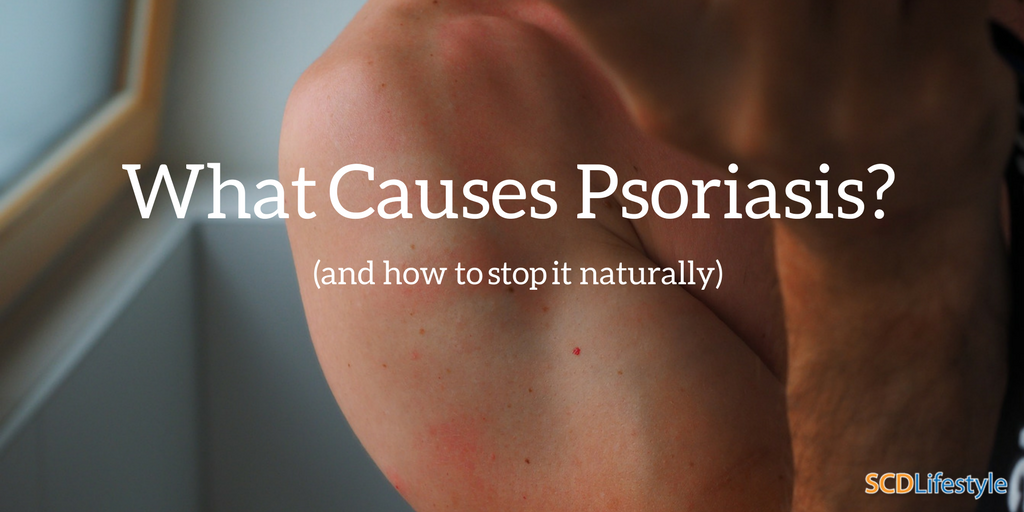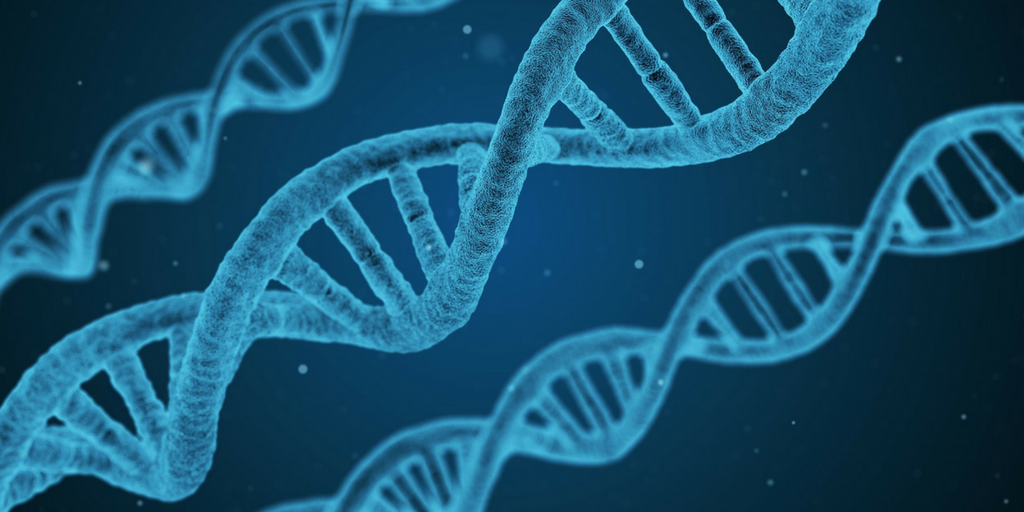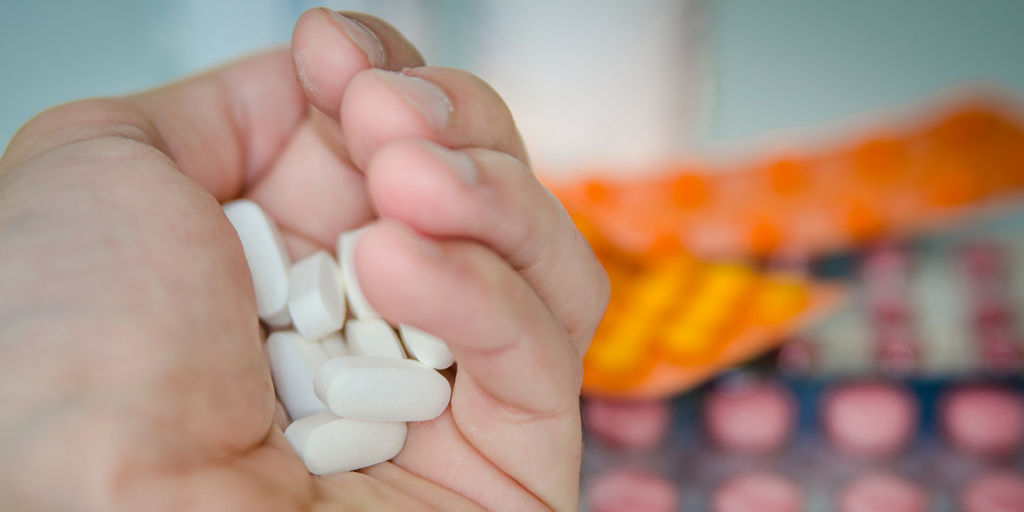What Causes Psoriasis (and How to Stop It Naturally)


For those who’ve been diagnosed with an autoimmune condition like psoriasis, I’m guessing you’re happy to finally have a label for those red, itchy patches on your skin.
And on the other hand, I’m guessing you’re a bit scared. It’s likely you’ve been told there isn’t much you can do about it and these were just the genes you were given.
Not only is psoriasis physically painful, but emotionally painful as well. Affected individuals may feel self-conscious about the way they look and many studies show those with psoriasis are more susceptible to depression and social isolation as compared to the general public.
But what if I told you there is something you can do about it?
Scientists are finding several key factors that can lead to psoriasis and many of these triggers are actually in our control.
This complex condition continues to be heavily researched, as it affects approximately 2% of the world’s population and over 150,000 new cases surface each year in the U.S alone.
Read on, as we dive into the details of autoimmunity, bring you the latest research, and help you discover the necessary tools to get your health back.
Is My Immune System Really Attacking My Skin?

The immune system’s main job is to protect the body from foreign invaders such as viruses or bacteria. But for those suffering with an autoimmune condition, this process doesn’t work as it was designed. The body begins to recognize it’s own cells as foreign and launches an attack on healthy tissue.
The result? An overactive immune system whose dysfunction is at the center of all autoimmune conditions.
Psoriasis is often referred to as a “T cell mediated disease.” T cells are a specific type of immune cell that are responsible for recognizing invaders and launching a healthy attack to protect the body. The attack is carried out by cytokines, which are proteins that help control the immune system’s inflammatory response.
Under normal conditions, helper T regulatory cells (Tregs) suppress inflammation, but those with psoriasis are found to have an excess of T helper cell inflammatory cytokines. Numerous publications have demonstrated the dysfunction of T helper cells in the onset of psoriasis and autoimmune diseases in general.
The overactive cytokines are what signal skin cells to be produced at an accelerated rate and the body simply can’t keep up. Dead skin cells begin to pile up and the cycle leads to the red, scaly, and itchy patches most commonly found on the elbows, knees and lower back.
If the above information has left you feeling betrayed by your own immune system… you’re not alone.
Thankfully, there are ways we can turn down those signals to the immune system by controlling the factors that send it into overdrive.
But Isn’t Psoriasis a Genetic Disease?

There is a genetic component to developing psoriasis, but this is just one piece of the puzzle.
A team of researchers from the University of Michigan have identified a common genetic variation that makes people much more susceptible to psoriasis. The gene is named PSORS1 and is the first one to be identified in a large clinical study.
“For every individual with psoriasis who carries the PSORS1 gene, there are 10 other people with the gene who don’t get psoriasis.” -Dr. James Elder, professor of dermatology and of radiation oncology in the Medical School and the Ann Arbor VA Healthcare System.
So, why do only 2-3 percent of the population develop the disease?
This is thought to be because only 2-3 percent have the “right” mix of genetics and are exposed to one or more environmental triggers.
In other words, having the genes can make you more susceptible to the disease, but this doesn’t automatically mean you will develop the disease. Triggers can be thought of as the fuel that ignites the fire.
That part is REALLY important…
So, what triggers this autoimmune skin condition?
Psoriasis Triggers

The exact cause of psoriasis is unknown, but researchers have found a number of triggers that have the ability to initiate the cascade of events that ultimately contribute to full-blown psoriasis.
Specific Immune Activators – Superantigens have a proven ability to induce high levels of inflammatory cytokines and/or initiate autoimmune responses that contribute to the development of skin and vascular disorders. The specific trigger for T cell activation has not yet been discovered, but a growing body of evidence shows a strong correlation between bacterial streptococcal (strep throat) antigens and the development of psoriasis. Supporting the immune system via a clean diet, supplements and stress management can all help the body fight off infection.
Stress – Studies have found an increase in circulating T lymphocytes after a period of mental stress, which helps explain why many psoriasis sufferers make the connection between a stressful period in their life and a flare up. That is why stress management is critical if you are suffering from Psoriasis. Exercise and meditation offer some powerful stress relieving benefits, while massage and deep breathing techniques can also be helpful.
Injury – Physical injury to the skin such as a cut, burn or scrape can trigger a flare. The koebner phenomenon describes the development of new skin lesions on areas of the skin where an injury has occurred. One clinical study tested this phenomenon and results showed 7 of the 12 psoriasis patients did develop lesions after a tape stripping injury. Treating the injured tissue right away, keeping the skin clean, and protecting the skin when possible can all be helpful measures.
Does Diet Affect Psoriasis?

The short answer is most definitely YES.
What we eat directly affects our gut by either helping it to heal/remain healthy, or by creating inflammation at a cellular level. Chronic inflammation can lead to a leaky gut (often referred to as increased intestinal permeability), and is the term used to describe a gut where the cellular lining becomes leaky and allows larger molecules to slip into the bloodstream.
The immune system identifies these molecules as foreign and ignites a full-blown immune response to get rid of the toxin. All types of food have the ability to contribute to this type of an inflammatory response, but poor protein digestion is especially significant in those with psoriasis.
Poor protein digestion can lead to an increased amount of polyamines in the bowel, which can further be metabolized by gut bacteria and made into toxic substances. Under normal conditions, polyamines are beneficial for regenerating cells. However, those with psoriasis are found to have elevated levels which could contribute to the rapid production of skin cells.
Proper digestion of protein molecules is extremely difficult for those who have a leaky gut, contributing to the constant stimulation of the immune system.
Adding additional stress to the immune system can trigger an inflammatory cascade and thus we must consider diet an important factor in the onset and maintenance of psoriasis.
The Gut-Skin Axis – A Fascinating Connection
Those with psoriasis are more likely to also suffer from digestive issues such as Celiac disease, gut infections, and inflammatory bowel disease (IBD).
So, what is the common denominator?
You guessed it – the answer lies in the gut. There are 3 main ways the gut is connected to the skin:
Malabsorption in the Gut – Researchers have found malabsorption in the gut to be more prevalent among psoriatic patients and could be one of the triggering factors between Celiac disease and psoriasis. T cells play an important role in the pathogenesis of both psoriasis and Celiac disease, which helps explain why patients with psoriasis are 2.5 times more likely to have Celiac disease and why psoriatic skin lesions improved with a gluten-free diet.
Dysbiosis of the Gut – Several studies show psoriasis sufferers have a lower relative abundance of multiple intestinal bacteria, which is associated with specific changes in inflammatory proteins as well as more susceptibility to bacterial infections. H. Pylori is a bacterial infection that is considerably more common in those with psoriasis and researchers found psoriatic lesions to improve once the infection was eradicated.
Inflammation in the Gut – One of the largest studies in women’s health found that out of 4,400 women with psoriasis, 423 (about 10%) also had Crohn’s disease and 187 had ulcerative colitis (UC). Both psoriasis and Celiac disease are well-recognized autoimmune disorders in which Th17 (helper T) cells are proven to play a crucial role. Th17 cells promote the secretion of a characteristic set of cytokines that regulate the autoimmune inflammatory cascade commonly associated with both psoriasis and Crohn’s disease.
These correlations help to show just how connected the gut and skin really are and have helped to advance the treatment and management of this unruly skin condition.
Traditional Treatment Options for Psoriasis

The upside of traditional steroid creams and prescription drugs is that they often work, but the success is typically short lived and comes with a whole host of side effects and risks.
One of the most frequently used remedies for psoriasis are topical steroid creams, which aim to reduce inflammation and decrease rapid skin production. When applied for long periods, the side effects include things like thinning of the skin, stretch marks, steroid rosacea and glaucoma or cataracts.
Light therapy is another form of treatment for psoriasis and works to slow down excessive skin cell growth. The inconvenient truth is that this must be performed regularly, skin may get worse before it gets better and for most, staying out of natural sunlight is recommended.
Nausea, itching, and redness typically accompany different forms of light therapy and more research is needed to determine the long-term efficacy of this treatment option.
A systemic medication, such as methotrexate, is a relatively new approach to treating psoriasis and works by binding to and inhibiting the enzyme that regulates skin growth. While proven effective in many tough psoriatic cases, the long list of side effects make it a risky choice.
Research has suggested an increased cancer risk with the use of systemic treatments and for most, this is enough to look elsewhere for safe and effective alternatives.
Many traditional treatments aim to deal with the symptoms, but miss the root cause. What if we could take a bigger-picture approach to psoriasis and attack it from the inside out?
The good news is, we can.
Reversing Psoriasis

Until recently, we used to think autoimmunity couldn’t be reversed once it was “turned on.”
However, the latest research is changing all of that.
Researcher Alessio Fasano, M.D. has been on the forefront of recent autoimmune disease research and published a paper titled “Leaky Gut and Autoimmune Diseases.”
His findings suggest a new theory that the prevention and reversal of autoimmune disease is possible. Fasano presents the idea that in order for an autoimmune condition to develop, 3 pre-existing conditions must all exist together.
- A genetic predisposition to autoimmunity (In psoriasis, this could be the CARD14, IL36RN and PSORS1 genes)
- An exposure to the environmental trigger (i.e. food, infection, physical injury)
- Increased Intestinal Permeability (Leaky Gut)
Fasano’s theory begins to open the idea that we might be able to actually turn off the autoimmune response in the body if we start with the gut
How to Turn Off Autoimmune Disease
All autoimmune conditions have one thing in common – an overactive immune system that must be triggered.
Research has helped us to identify and understand these triggers and now it’s up to us to address them.
Based on the work of Dr. Alessio Fasano, one of the first places to start is your gut… and we’re here to help you.
We hosted a free webinar called, “How to Turn Off Your Autoimmunity and Restore a Healthy Immune System.”
It’s completely free, and we walk you through how to address the health of your gut so that your immune system can stop attacking itself.
The topic of autoimmunity is complicated and the amount of information out there can be overwhelming. That’s why we’ve done the work for you and are grateful to support you on this journey.
-Steve
Did You Like this Article?
Subscribe to our newsletter to receive email notifications, some ways to find relief, and next steps.
